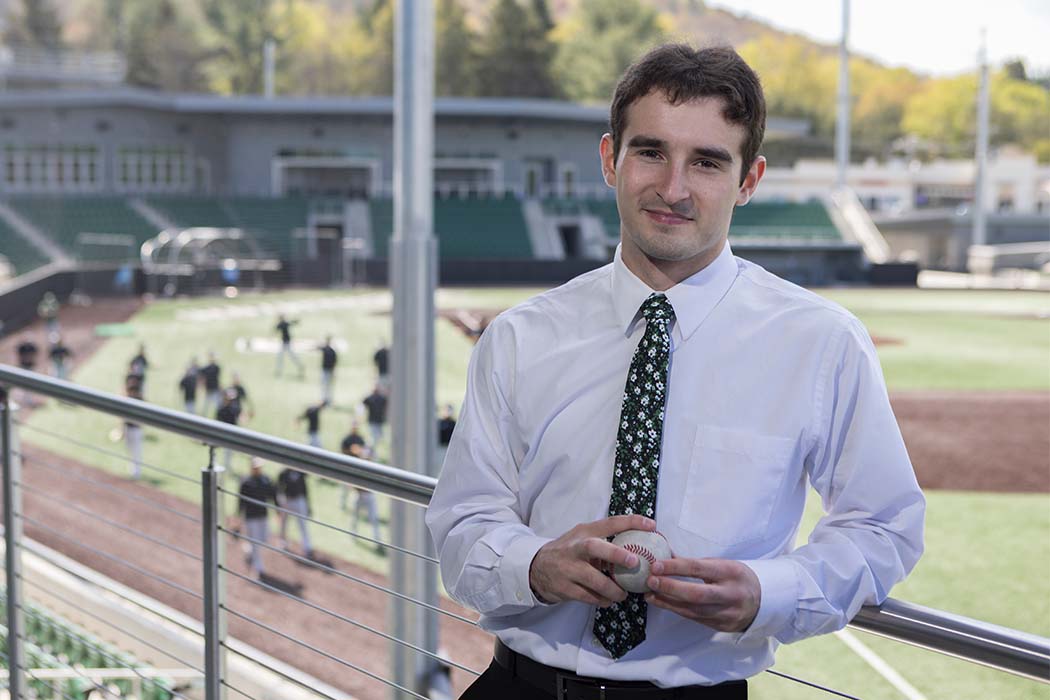How a Binghamton grad turned a heart-stopping accident into advocacy
Joe Mendrick ’22, MBA ’23 teamed up with the American Heart Association to lobby for life-saving CPR bill

When he was only 11 years old, Joe Mendrick’s heart stopped beating.
“I don’t remember that day whatsoever,” says Mendrick. “All I know about that day is from what people have told me.”
On April 16, 2012, Mendrick went up to the plate to bat in his little league game in Colonie, N.Y. The pitcher threw the ball, and he swung. The baseball struck him in the chest.
What happened next can only be described as a statistical anomaly. Hitting him at just the right speed and at just the right moment during a very short window in his heart rhythm, the strike disrupted his heartbeat and sent him into a very sudden cardiac arrest, stopping his heart completely.
This condition, known as commotio cordis, is extremely rare, with less than a dozen new cases reported each year, according to the American Heart Association. It became more widely known after Buffalo Bills football player Damar Hamlin suffered from the condition during a nationally televised game in January 2023.
Mendrick collapsed. His coach began doing CPR compressions immediately. 911 was called. Others, including a police officer, began to help with CPR until an ambulance arrived.
Thankfully, the paramedics and EMTs were able to get Mendrick’s heart beating again.
“I was dead without a heartbeat for about six minutes or so,” says Mendrick. “I’m so very thankful for everyone who was there that day. They helped me survive.”
Back in the game
Mendrick doesn’t remember much of the week he spent in the hospital, but the brain scan in an MRI machine stands out.
“It’s kind of funny – I was a Chris Brown fan at the time, so they had that playing on the speaker during the MRI. I remember them playing that music,” he laughs.
Because of the lack of oxygen being transported to his brain during the accident, there was an initial fear that he had suffered brain damage. However, tests showed that this was not the case.
“Somehow, there were no issues or complications whatsoever,” he says. “I’m very lucky.”
His family was by his side during his recovery. Mendrick says it was his father who inspired his love of baseball.
“He always tried to get me to watch baseball games when I was younger, but I could never get into it,” he says. “But then he took me to a Yankees game and being in that environment – it was kind of a life-changing experience for me.”
Mendrick decided not to let the accident stop him from playing baseball.
“I didn’t want this to scare me away from baseball, because it was such a freak accident. There is such a slim chance of this happening to me again, and I didn’t think it was worth me not playing baseball anymore,” he says.
Mendrick would go on to continue playing baseball until he graduated high school.
“I didn’t want this to scare me away from baseball, because it was such a freak accident. There is such a slim chance of this happening to me again, and I didn’t think it was worth me not playing baseball anymore,” he says.
Mendrick would go on to continue playing baseball until he graduated high school.
Stepping up to the plate
To say Mendrick took an unfortunate event and turned it into a positive is an understatement. He went on to become an advocate with the American Heart Association (AHA), a nonprofit organization that funds research and educates the public about cardiovascular health.
“My gym teacher’s wife worked with the AHA and thought my story could make a real impact,” Mendrick says. “So, he asked me in gym class if I was interested in helping them and we took it from there.”
Mendrick started helping with AHA events that educated others on the importance of CPR. He even helped set a Guinness World Record for the most people performing consecutive CPR at an event in Times Square. Celebrities such as television personality Star Jones and WNBA player Tina Charles were even in attendance.
“It was a marathon of people just getting in line to do CPR on a mannequin, and it went on for almost eight hours,” he says. “The record was broken again shortly after, but it was a fun opportunity for us to train a bunch of people how to do CPR.”
Mendrick began lobbying for New York state to require high schools to offer training in hands- only CPR to students. Whether it was speaking to legislators in Albany, N.Y., or sharing his story with news reporters, Mendrick was determined to help get the requirement passed.
“I was in the chamber when the bill eventually passed. It only took a couple of minutes – it was much quicker than I expected,” he recalls. “It was a great day, and I’m so proud of the efforts that went into getting it done.”
Mendrick hopes his advocacy, and the lives that could be saved because of it, will be a lasting part of his legacy.
“I think a lot of people remember me for the accident, but there is so much more to it,” he says. “I’d rather be remembered for what I did as a result of the accident.”
Extra innings
With an interest in financial markets, Mendrick came to the Binghamton University School of Management to major in business administration with a concentration in quantitative finance.
He went on to earn his Master of Business Administration (MBA) at SOM, which he completed in May 2023.
“Binghamton is an amazing school,” he says. “There are so many different people here, and they are all hard working. Everyone has goals, everyone has ambition, which is something I really appreciated because I have big ambitions myself.”
Now a financial planning consultant in the Albany area, Mendrick hopes to one day break into investment banking in New York City.
While his baseball days are mostly behind him, Mendrick has taken up some new hobbies like golfing, snowboarding and fishing. He’s also upped his chess game.
“I’ve been playing chess since I was young, but played a lot more in college,” he says. “I’ve been working on it and have gotten pretty good.”
More than 11 years have passed since the accident and in that time, Mendrick has learned to contextualize the weight of what happened to him.
“I was a different person back then. I was a kid, and it was hard to wrap my head around what happened,” he says. “Now, I can recognize just how serious the incident was and see the impact I made with the American Heart Association in getting the hands- only CPR legislation passed. And when I look back on it now, I’m very proud.”


